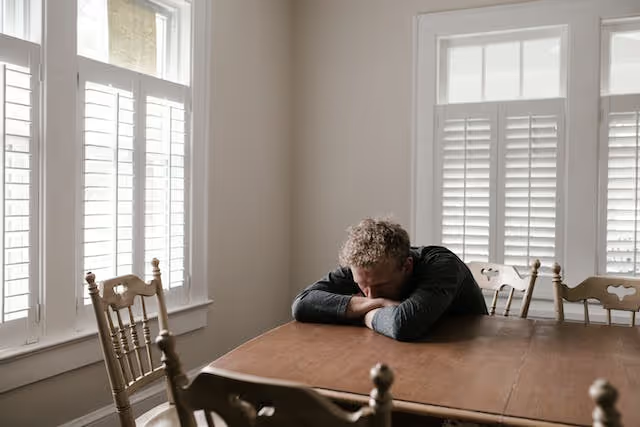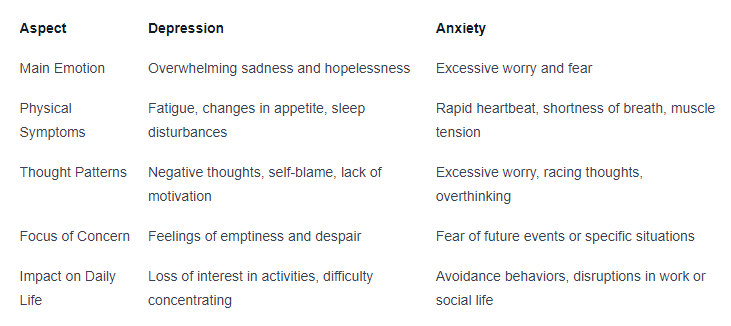Depression vs. Anxiety: Which One Do I Have?

Understanding Depression and Anxiety
When it comes to mental health, it's important to have a clear understanding of common conditions like depression and anxiety. While they can often coexist or share similar symptoms, they are distinct disorders that require different approaches to diagnosis and treatment. Let's explore what depression and anxiety are and the key differences between them.
What is Depression?
Depression is a mood disorder characterized by persistent feelings of sadness, hopelessness, and a loss of interest or pleasure in activities. It affects how a person thinks, feels, and behaves. Individuals with depression may experience a range of emotional, physical, and behavioral symptoms that can significantly impact their daily life.
Depression can manifest in various forms, including major depressive disorder, persistent depressive disorder, and seasonal affective disorder. It is important to note that depression is not just a fleeting sadness or a temporary state of mind; it is a serious mental health condition that requires proper assessment and treatment.
What is Anxiety?
Anxiety, on the other hand, is a condition characterized by excessive worry, fear, and apprehension. It is a normal response to stress but becomes problematic when it interferes with a person's ability to function. Anxiety disorders can manifest in different ways, such as generalized anxiety disorder, panic disorder, social anxiety disorder, and specific phobias.
Individuals with anxiety disorders often experience persistent and excessive worry, physical symptoms such as rapid heartbeat and sweating, and may engage in avoidance behaviors. Anxiety can be distressing and impact various aspects of a person's life, including work, relationships, and overall well-being.
Key Differences Between Depression and Anxiety
Depression and anxiety share some similarities in terms of symptoms and impact on daily life. However, there are key differences between the two:

It's important to note that individuals can experience both depression and anxiety simultaneously. In such cases, it is often referred to as comorbid depression and anxiety. Understanding the key differences between depression and anxiety can help individuals and healthcare professionals in accurately diagnosing and developing appropriate treatment plans for each condition.
Remember, if you suspect that you or someone you know may be experiencing symptoms of depression or anxiety, it is crucial to seek professional help for an accurate diagnosis and appropriate treatment. Mental health professionals can provide the necessary support and guidance to help individuals navigate their mental health challenges effectively.
Common Symptoms of Depression
Depression is a complex mental health condition that can manifest in various ways. It is important to recognize the common symptoms of depression in order to seek appropriate help and support. The symptoms of depression can be categorized into three main areas: emotional, physical, and behavioral.
Emotional Symptoms of Depression
The emotional symptoms of depression often involve persistent feelings of sadness, hopelessness, and emptiness. Individuals with depression may experience a loss of interest or pleasure in activities they once enjoyed. Other emotional symptoms may include:
- Persistent feelings of sadness or a depressed mood
- Feelings of worthlessness or excessive guilt
- Irritability or frustration, even over small matters
- Difficulty concentrating or making decisions
- Loss of interest or pleasure in activities
- Thoughts of death or suicide
Physical Symptoms of Depression
Depression can also manifest with physical symptoms, which may vary from person to person. These physical symptoms can include:
Physical Symptoms of Depression
Fatigue or loss of energy
Sleep disturbances (insomnia or excessive sleeping)
Changes in appetite or weight
Headaches or migraines
Digestive problems
Body aches or pains
It's important to note that these physical symptoms can also be associated with other medical conditions, so it is crucial to consult with a healthcare professional for an accurate diagnosis.
Behavioral Symptoms of Depression
Depression can significantly impact a person's behavior and daily functioning. Some common behavioral symptoms of depression include:
- Withdrawal from social activities and hobbies
- Decreased productivity and difficulty concentrating
- Changes in appetite or weight
- Restlessness or agitation
- Neglecting personal hygiene and self-care
- Increased use of alcohol or drugs
Recognizing these behavioral symptoms in oneself or a loved one is crucial for understanding and addressing the potential presence of depression.
Understanding the common symptoms of depression, including emotional, physical, and behavioral indicators, can help individuals identify the need for professional support and take appropriate steps toward managing their mental health. If you or someone you know is experiencing symptoms of depression, it is important to seek professional help for an accurate diagnosis and appropriate treatment.
Common Symptoms of Anxiety
Anxiety is a complex condition that can manifest in various ways. It's important to recognize the common symptoms of anxiety to better understand and differentiate it from depression. The symptoms can be classified into three categories: emotional, physical, and behavioral.
Emotional Symptoms of Anxiety
Emotional symptoms of anxiety often involve intense feelings of fear, worry, or apprehension. Individuals experiencing anxiety may find it challenging to control their thoughts and may constantly anticipate potential dangers or negative outcomes. Common emotional symptoms of anxiety include:
- Excessive worrying
- Feeling restless or on edge
- Irritability
- Difficulty concentrating
- Fear of losing control
- Panic or feelings of impending doom
Physical Symptoms of Anxiety
Anxiety can also manifest itself in physical symptoms that affect the body. These symptoms can vary from person to person and may include:
- Rapid heartbeat or palpitations
- Shortness of breath or difficulty breathing
- Sweating
- Trembling or shaking
- Muscle tension or aches
- Headaches
- Upset stomach or gastrointestinal issues
Behavioral Symptoms of Anxiety
Anxiety can significantly impact an individual's behavior and daily functioning. These behavioral symptoms may manifest as avoidance or changes in routine, as individuals try to cope with their anxiety. Common behavioral symptoms of anxiety include:
- Avoiding certain situations or places that trigger anxiety
- Difficulty sleeping or experiencing insomnia
- Restlessness or feeling constantly on edge
- Changes in appetite, such as overeating or undereating
- Difficulty concentrating or making decisions
- Engaging in compulsive behaviors or rituals to alleviate anxiety
Recognizing these common symptoms of anxiety is the first step in understanding and seeking appropriate help. If you experience these symptoms persistently and they interfere with your daily life, it is essential to consult a healthcare professional for a proper diagnosis and treatment plan tailored to your specific needs.
When to Seek Professional Help
It can be challenging to differentiate between depression and anxiety on your own, especially when the symptoms overlap. However, recognizing when to seek professional help is crucial for getting an accurate diagnosis and appropriate treatment. Here are two important aspects to consider when deciding whether to seek professional assistance.
Self-Assessment
Conducting a self-assessment can provide valuable insights into your mental health and help you determine if your symptoms align more with depression or anxiety.
By honestly answering these questions, you can gain a better understanding of the symptoms you are experiencing and whether they align more with depression or anxiety. However, it's important to remember that self-assessments are not a substitute for a professional diagnosis.
Importance of Seeking Diagnosis and Treatment
Seeking a professional diagnosis is crucial for accurately identifying whether you are dealing with depression, anxiety, or a combination of both. While self-assessments can provide initial insights, a mental health professional can conduct a thorough evaluation and provide a definitive diagnosis.
Receiving a proper diagnosis is the first step towards effective treatment. Mental health professionals can create a personalized treatment plan tailored to your specific needs, whether it involves therapy, medication, or a combination of both. They can also provide guidance and support throughout your journey to better mental health.
Remember, mental health conditions like depression and anxiety are treatable. Seeking professional help is not a sign of weakness but rather a courageous step towards improving your well-being. If you are experiencing symptoms that are affecting your daily life, relationships, or overall functioning, don't hesitate to reach out to a qualified mental health professional who can provide the support you need.
Managing Depression and Anxiety
When it comes to managing depression and anxiety, there are various treatment options available that can help individuals find relief and improve their overall well-being. It's important to note that treatment approaches may vary depending on the severity of symptoms and individual needs. In this section, we will explore treatment options for depression, treatment options for anxiety, and strategies for coping with both depression and anxiety.
Treatment Options for Depression
Treating depression often involves a combination of therapies, lifestyle changes, and, in certain cases, medication. Here are some common treatment options for depression:
Treatment Options for Depression
Psychotherapy (talk therapy)
Cognitive Behavioral Therapy (CBT)
Medications (antidepressants)
Lifestyle changes (exercise, sleep, nutrition)
Support groups
Stress reduction techniques (mindfulness, relaxation exercises)
It's important to consult with a healthcare professional to determine the most appropriate treatment plan for your specific situation. They can help assess the severity of your depression and recommend the most effective course of action.
Treatment Options for Anxiety
Treating anxiety involves various approaches aimed at reducing symptoms and improving overall quality of life. Here are some common treatment options for anxiety:
Treatment Options for Anxiety
Psychotherapy (talk therapy)
Cognitive Behavioral Therapy (CBT)
Medications (anti-anxiety medications)
Relaxation techniques (deep breathing, meditation)
Lifestyle changes (exercise, stress management)
Support groups
Again, it's crucial to consult with a healthcare professional to determine the most suitable treatment plan for your specific anxiety symptoms. They can assess the severity of your anxiety and guide you towards the most effective treatment options.
Strategies for Coping with Both Depression and Anxiety
Managing both depression and anxiety at the same time can be challenging, but there are strategies that can help individuals cope with both conditions simultaneously. Here are some strategies to consider:
- Seek professional help: Consulting with a mental health professional who specializes in treating both depression and anxiety can provide valuable guidance and support.
- Practice self-care: Engage in activities that promote self-care and well-being, such as regular exercise, healthy eating, and sufficient sleep.
- Establish a support system: Surround yourself with a supportive network of friends, family, or support groups who can provide understanding and encouragement.
- Learn stress management techniques: Explore techniques like deep breathing exercises, meditation, or mindfulness to help manage stress and reduce symptoms.
- Set realistic goals: Break tasks into smaller, manageable steps to prevent feeling overwhelmed and accomplish goals at a pace that suits you.
- Develop healthy coping mechanisms: Identify healthy coping mechanisms that work for you, such as journaling, engaging in hobbies, or seeking creative outlets.
Remember, managing depression and anxiety is a journey, and it may take time to find the right combination of treatments and strategies that work for you. Be patient and persistent in your efforts, and don't hesitate to reach out for professional help when needed.
Conclusion
In conclusion, recognizing the symptoms of depression and anxiety is crucial for seeking appropriate help and support. While the two conditions share some similarities, they are distinct mental health issues that require tailored treatment approaches. Seeking professional help is an essential step towards managing depression and anxiety effectively. With various treatment options available, individuals can find relief and improve their overall well-being.
Remember that mental health conditions are treatable, and there is no shame in seeking help. By taking steps towards better mental health, individuals can lead fulfilling lives and enjoy meaningful relationships with those around them.
